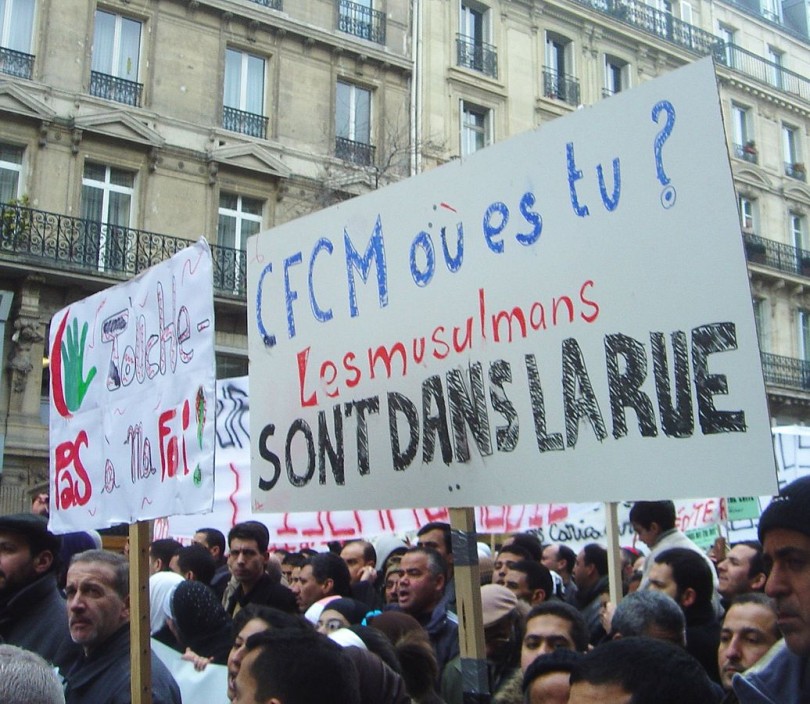aNewDomain — This week’s terrorist attacks at the Paris offices of the Charlie Hebdo satirical magazine, leaving 12 dead at the scene and four others killed during the assassins’ attempt to flee two days later has prompted a political crisis in France centered around that country’s Muslim population, and whether it has been successfully assimilated into French society.
To most American news consumers, even those who follow developments in Europe closely, the debate over Muslim assimilation in France is difficult to dissect. This is because the situation there is significantly unlike the “clash of civilizations” between Islam and the West that Americans have been dealing with in the post-9/11 era.
The first thing that you need to know is that, in France even more than in the United States, assimilation is something of a national religion.
“A French government report has proposed a radical overhaul of the ‘assimilation’ model which requires immigrants to abandon their culture for that of France, including ending the ban on Muslim headscarves in schools and naming streets and squares after notables of foreign origin,” the UK Telegraph reported back in 2013.
“But it has drawn a furious reaction from the country’s conservative opposition, which said it amounted to an abandonment of French culture and secular values. ‘It will no longer be up to immigrants to adopt French culture but up to France to abandon its culture, its values, its history to adapt to the culture of others,’ Jean-François Copé, leader of the UMP main opposition party, said.”
For now, assimilationism stands.
In France as in the US, ethnic and religious minorities congregate in certain cities and neighborhoods. In France, however, these ethnic enclaves are viewed less as charming places to grab a meal than as a failure of the state. This is because, when foreigners are granted French citizenship, they are expected – not just culturally, but explicitly told by government officials – to become fully French in a traditional, pre-mass immigration kind of way.
Those who speak foreign languages are pressured to refrain from speaking them in public as much as possible, and to learn French not just enough to get by, but fluently in writing as well as in speech. This attitude isn’t not quite as attenuated as it was 75 years ago, when children who spoke internal non-French French languages like Basque and Breton were beaten by their teachers, but it’s still an expectation shared by both the political left and the political right.
Even today, when the government offers an immigrant French citizenship, he or she is even encouraged to “Francify” their name to a more traditionally sounding French name. So Mohammed might become Michel.
The second thing you need to understand is that France does not offer birthright citizenship, i.e. automatic full benefits as a citizen simply for being born on French territory. Americans take birthright citizenship for granted, though there has been criticism on the right over the possibility that some foreign-born parents might travel illegally to the United States in order to have so-called “anchor babies.”
Perversely, considering how important assimilation is to the French, the country’s lack of full birthright citizenship rights for everyone born in France, or full right of jus soli, has done more to breed alienation, systemic poverty and distrust than just about any other policy. Although I was able to obtain French citizenship (while keeping my US citizenship) merely because my mother is French, there are millions of second- and third-generation illegal immigrants – people who were born in French, and who may even have French foreign parents, but who have never been naturalized because their grandparents arrived in the country as undocumented workers.
Many of these people live in impoverished suburbs outside major cities which, not coincidentally, have on occasion been the site of violent uprisings.
Don’t be surprised if the perpetrators of Wednesday’s horrific mass murder at Charlie Hebdo have their roots in the banlieue (suburbs).
Finally, France has accepted between 3.5 and 5.0 million Muslim immigrants in recent years, amounting to between 5% and 10% of the population. (This liberal immigration policy recognizes France’s history as colonial rulers of countries like Algeria and Morocco.)
Obviously, the overwhelming majority of these people are like everyone else, just trying to get ahead and make better lives for themselves and their children. But their presence — different clothes, different languages, different food — is jarring for “traditional” (i.e., white, Catholic) Frenchmen and Frenchwomen who yearn for the France of wine, coffee and baguettes. This is the constituency that France’s far-right political parties, like the National Front, are capitalizing upon.
For aNewDomain, I’m Ted Rall.
Cover image: “Paris 2006-02-11 anti-caricature protest anti CFCM dsc07482“. Licensed under Wikimedia Commons.













